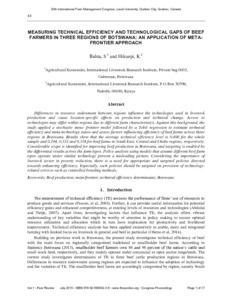Measuring technical efficiency and technological gaps of beef farmers in three regions of Botswana: An application of meta-frontier approach
Abstract
Differences in resource endowment between regions influence the technologies used in livestock production and cause location-specific effects on production and technical change. Access to
technologies may differ within regions due to different farm characteristics. Against this background, the study applied a stochastic meta- frontier model followed by a Tobit regression to estimate technical efficiency and meta-technology ratios and assess factors influencing efficiency of beef farms across three regions in Botswana. Results show that the average technical efficiency level is 0.496 for the whole sample and 0.194, 0.331 and 0.318 for beef farms in South East, Central and Chobe regions, respectively. Considerable scope is identified for improving beef production in Botswana, and targeting is enabled by the differential results across the farm types. Policy analysis using models that assume different beef farm types operate under similar technology present a misleading picture. Considering the importance of livestock sector in poverty reduction, there is a need for appropriate and targeted policies directed towards enhancing efficiency. Especially, such policies should be targeted on provision of technology related services such as controlled breeding methods.

